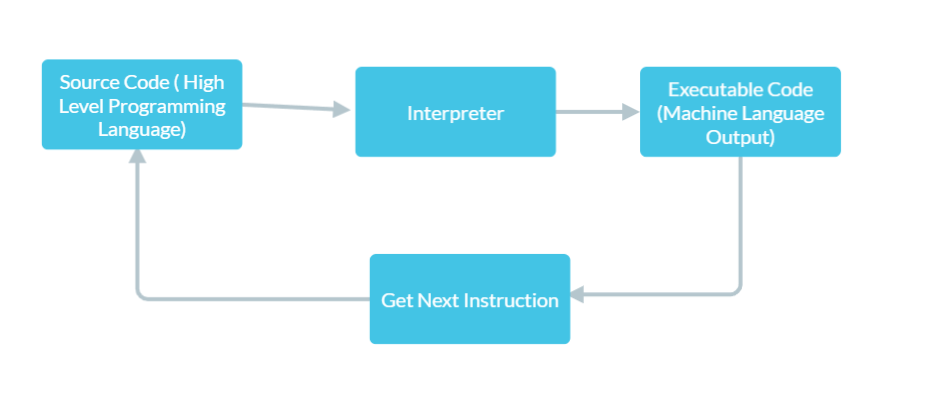Python - Interpreter vs Compiler
What are Interpreters?
Interpreters are the computer program that will convert the source code or an high level language into intermediate code (machine level language). It is also called translator in programming terminology. Interpreters executes each line of statements slowly. This process is called Interpretation.

Example: Here is the simple Python program that takes two inputs as a and b and prints the sum in the third variable which is c. It follows sequential as well as functional execution of programs
a = 5
b = 4
c = a + b
print(c) # output 9
Python Interpreter
Python is an interpreted language developed by Guido van Rossum in the year of 1991. As we all know Python is one of the most high-level languages used today because of its massive versatility and portable library & framework features. It is an interpreted language because it executes line-by-line instructions. There are actually two way to execute python code one is in Interactive mode and another thing is having Python prompts which is also called script mode. Python does not convert high level code into low level code as many other programming languages do rather it will scan the entire code into something called bytecode. every time when Python developer runs the code and start to execute the compilation part execute first and then it generate an byte code which get converted by PVM Python Virtual machine that understand the analogy and give the desired output.
Interpreted Languages: Perl, BASIC, Python, JavaScript, Ruby, PHP.
Compiled Languages: C, C++, C#, COBOL and CLEO.
Difference between Compiler and Interpreter
Compilers and interpreters are two types of language processors used to convert high-level programming languages into machine code, enabling the computer to understand and execute the instructions. While they serve the same fundamental purpose, their working principles, advantages, and disadvantages differ significantly.
Compilers
A compiler translates the entire source code of a program into machine code before execution. This process involves several stages: lexical analysis, syntax analysis, semantic analysis, optimization, and code generation. The result is a standalone executable file that can be run on the target machine.
Advantages of Compilers
- Execution Speed: Since the entire program is translated into machine code before execution, the resulting executable runs significantly faster compared to interpreted code. This is because the translation happens only once, and there is no need for repeated interpretation.
- Optimization: Compilers can perform various optimizations during the translation process to improve the performance and efficiency of the generated machine code. These optimizations can include removing redundant code, inlining functions, and more.
- Error Detection: Compilers analyze the entire code before generating the executable. This thorough analysis allows for the detection of syntax and semantic errors early in the development process, reducing the likelihood of runtime errors.
- Distribution: Compiled executables can be distributed without the source code, protecting the intellectual property of the developer and simplifying the distribution process.
Disadvantages of Compilers
- Compilation Time: The process of compiling a large program can be time-consuming, especially for complex applications. This can slow down the development cycle, as developers need to wait for the compilation to complete before testing changes.
- Lack of Portability: Compiled code is specific to a particular machine architecture and operating system. This means that the same program needs to be recompiled for different platforms, which can be cumbersome.
- Debugging Difficulty: Debugging compiled programs can be more challenging because the source code is not executed directly. Developers often need to use specialized debugging tools to trace and diagnose issues in the machine code.
Interpreters
An interpreter translates and executes the source code line-by-line at runtime. Instead of generating a standalone executable, it directly executes the instructions written in the high-level language.
Advantages of Interpreters
- Ease of Use: Interpreters are often more user-friendly, especially for beginners. Since code is executed line-by-line, developers can test and debug small sections of code interactively, making the development process more intuitive and agile.
- Portability: Interpreted programs are generally more portable since the source code can be executed on any machine with a compatible interpreter. This eliminates the need for recompilation across different platforms.
- Immediate Feedback: The ability to execute code on-the-fly allows for immediate feedback, which is beneficial for rapid prototyping and iterative development. Developers can quickly test changes without waiting for the entire program to be compiled.
Disadvantages of Interpreters
- Execution Speed: Interpreted programs typically run slower than compiled programs because each line of code is translated and executed at runtime. This repeated interpretation introduces overhead that can significantly impact performance.
- Less Optimization: Interpreters usually perform minimal optimizations, leading to less efficient execution compared to compiled code. This can be a drawback for performance-critical applications.
- Runtime Errors: Since interpreters execute code on-the-fly, runtime errors may only become apparent during execution. This can lead to unstable programs if thorough testing is not conducted.
- Resource Consumption: Interpreters often require more memory and processing power during execution, as they need to maintain the context of the source code and manage the translation process simultaneously.
Conclusion
Both compilers and interpreters have their unique advantages and disadvantages, making them suitable for different types of applications and development scenarios. Compilers are ideal for performance-critical applications where execution speed and code optimization are paramount. In contrast, interpreters are well-suited for rapid development, testing, and environments where portability and ease of use are more important. Understanding these differences helps developers choose the appropriate tool for their specific needs, balancing development efficiency and execution performance.
